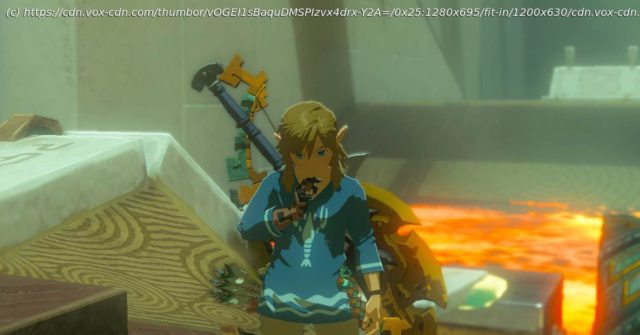Game developers explain why The Legend of Zelda: Tears of the Kingdom’s bridge and door physics are so impressive.
There’s a bridge to cross the lava pit in The Legend of Zelda: Tears of the Kingdom’s Marakuguc Shrine, but it’s broken. More than half of the bridge is piled on top of itself on one side of the pit, with one clipped-off segment on the other. The bridge is the obvious choice for crossing the lava, but how to fix it?
A clip showing one potential solution went viral on Twitter shortly after Tears of the Kingdom’s release: The player uses Link’s Ultrahand ability to unfurl the stacked bridge by attaching it to a wheeled platform in the lava. When the wheeled platform — now attached to the edge of the bridge — activates and moves forward, it pulls the bridge taut, splashing lava as it goes, until the suspension bridge is actually suspended and can be crossed. But it wasn’t the solution itself that resonated with players; instead, the clip had game developers’ jaws on the ground, in awe of how Nintendo’s team wrangled the game’s physics system to do that.
To players, it’s simply a bridge, but to game developers, it’s a miracle.
“The most complicated part of game development is when different systems and features start touching each other,” said Shayna Moon, a technical producer who’s worked on games like the 2018 God of War reboot and its sequel, God of War: Ragnarök, to Polygon. “It’s really impressive. The amount of dynamic objects is why there are so many different kinds of solutions to this puzzle in particular. There are so many ways this could break.”
Moon pointed toward the individual segments of the bridge that operate independently. Then there’s the lava, the cart, and the fact you can use Link’s Ultrahand ability to tie any of these things together — even the bridge back onto itself.
Nintendo reportedly used a full year of Tears of the Kingdom’s development for polish, and it shows. “The amount of different options available is a testament to the amount of work that every single person at every level of the team did, especially the QA testers,” Moon said. “Open-world games with a ton of real-time physics objects like this are notoriously difficult to QA test.”
Another big game that inspired this sort of physics-based shock and awe from game developers on social media was in 2020, when The Last of Us Part 2 included a rope necessary for solving a puzzle. Like Tears of the Kingdom’s bridge, the rope and its natural-seeming movements were just something players expected to work, but game developers could see how much work went into the development of it.
The bridge has a ton of different points that are pulling on each other within the physics system, said Luna Nielsen, a software engineer who goes by Luna the Foxgirl online and livestreams about the complexities of game engines.
Start
United States
USA — software Why Tears of the Kingdom’s bridge physics have game developers wowed






